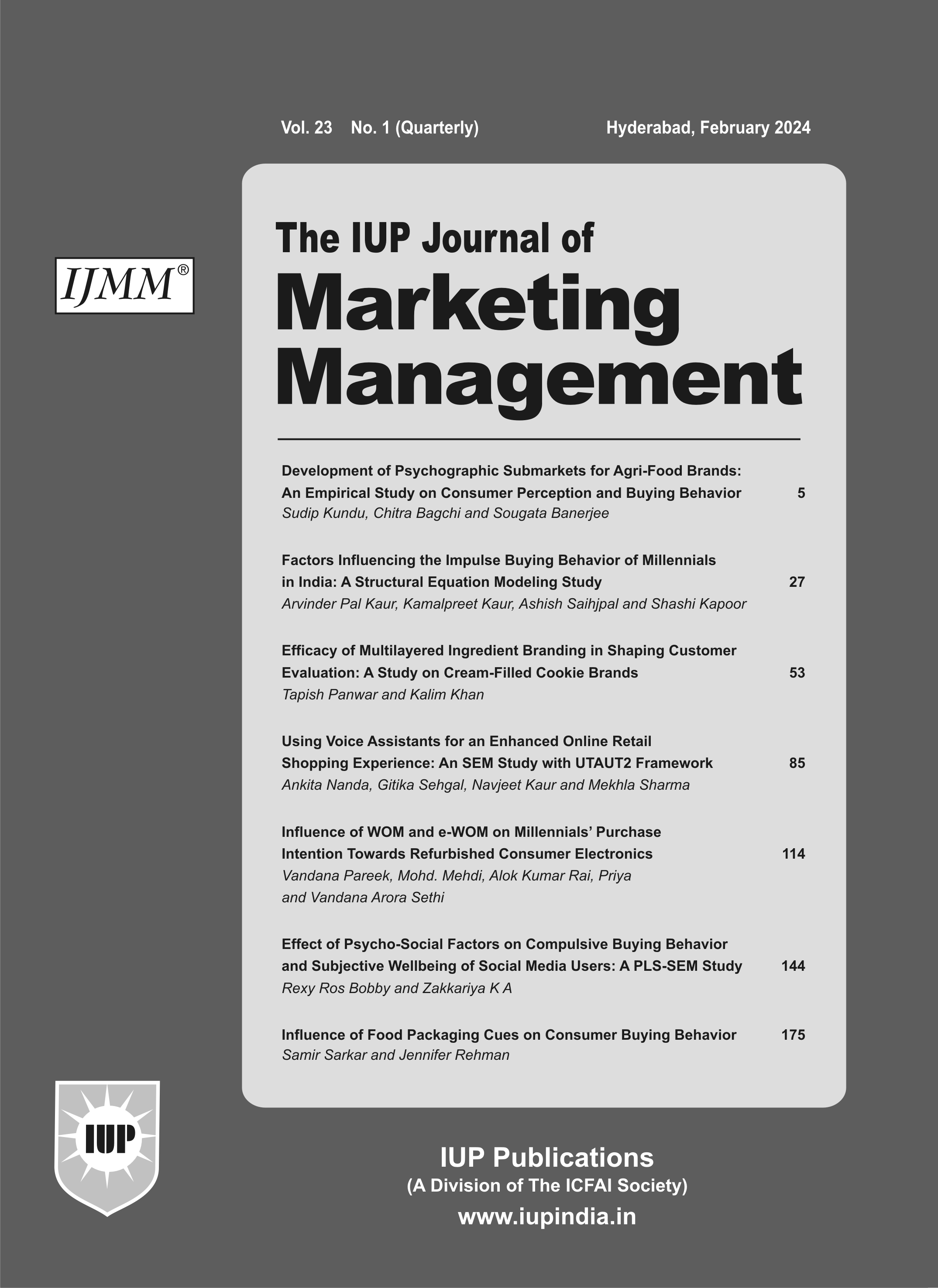
Aug'22
The IUP Journal of Marketing Management
Archives
Social Media Marketing and Gen Z: A Study of Brand Attitude, Self-Brand Connection and Purchase Intention
Marketing in the digital age poses many challenges as channels become more fragmented and continue to evolve. More so when it comes to Gen Z who are more active on social media. The unprecedented development and popularity of social media platforms has led to many studies on the impact of Social Media Marketing (SMM) on Gen Z. The current study establishes the relationship between SMM, brand attitude, Self-Brand Connection (SBC), and purchase intention. The data was gathered using convenience sampling method from 200 young consumers in the age group of 11-24 years through an online questionnaire. Regression analysis was done to evaluate the data. The results revealed that SMM has a significant effect on the brand attitude, SBC and purchase intention of Gen Z. FullArticle...
Customer Demographics and Their Influence on Relationship Quality in Online Travel Industry
Online Travel Agencies (OTAs) are becoming extremely popular nowadays and every year they spend millions of dollars to attract customers from around the world. The paper focuses on OTAs and aims at determining the influence of demographic characteristics of customers on relationship quality. A descriptive research design was employed. The objectives were achieved by a critical review of documented sources to derive a detailed understanding of the background and subsequently by an analysis of responses gathered from the customers of OTAs in Delhi and the NCR region through a self-administered questionnaire. Statistical analysis was computed using SPSS 21.0 through ANOVA and the results revealed that no significant difference was found in any of the chosen variables of customer demographics. FullArticle...
Consumer Behavior and Online Payments with Reference to Trust and Mobility: A PLS-SEM Analysis
The study explores the determinants that affect consumer behavior towards online payments and attempts to identify the significance of mobility and trust. The conceptual model of the study was tested on 280 respondents using Structural Equation Model (SEM). The findings indicate that attitude is significantly associated with the intention of the consumer towards online payments, which in turn is significantly associated with perceived ease of use and perceived usefulness. Trust and mobility are significantly associated with perceived ease of use. Trust in turn is significantly associated with perceived reputation and perceived risk. The study would help organizations that are providing online payment services to identify the factors that make the entire process of online payments smooth for an individual. FullArticle...
Dimensions of Consumers' Online Grocery Shopping Motives and Their Relationship with Satisfaction Levels
The normal grocery shopping process of middle-class consumers was largely affected by the Covid-19 pandemic and the online mode has become more popular. The paper seeks to understand the dimensions of motives behind this change and the relationship with satisfaction levels from online grocery shopping experience. A two-step research method is applied for the study. At first exploratory research was carried out to understand the motives, and in the next step, a quantitative analysis was carried out to identify the dimensions of the motives and their relationship to consumer satisfaction. The findings of the study revealed that the identified motives have a significant influence on the satisfaction of the online grocery shoppers. This shall help the online grocery players to design their offerings in a way to satisfy the customers largely and thereby gain a higher market share. FullArticle...
Linking Product Attributes and Customer Value: The Mediating Role of Customer Trust
In industries like telecom, where the business environment is turbulent, marketers continuously face the challenging task of creating above-average customer value to attract and retain customers. Addressing this challenge, the current study proposes a model to create customer value by leveraging product attributes and customer trust. The study empirically examines the mediating role of customer trust in the relationship between product attributes and customer value and provides empirical evidence for the proposed model. It also substantiates that product attributes and customer trust create customer value, and also proves the mediating role of customer trust. FullArticle...